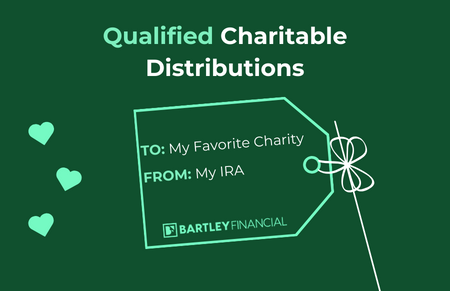A Qualified Charitable Distribution (QCD) involves a transfer of funds from your IRA custodian directly to a qualified charity. Not only do QCDs count towards meeting your IRA required minimum distributions (RMDs) for the year, but they also come with distinct advantages.
Beyond the inherent benefit of supporting charitable causes, a noteworthy feature of QCDs is that they are excluded from taxable income. This sets them apart from most regular IRA withdrawals.
QCDs are not only excluded from income, they also leave you with a lower Adjusted Gross Income (AGI). AGI is a key measure used in the calculation of a variety of tax deductions and credits. It’s used in calculations as diverse as the taxability of your Social Security benefits and how much you will pay for Medicare premiums. It is for this reason that QCDs can provide a bigger bang for the buck than a charitable contribution deduction (for those who can still claim itemized deductions!) If you do itemize, be aware that since your QCDs reduce your taxable IRA distributions, you can’t double dip by claiming them as itemized deductions as well.
If you do itemize deductions, here is an article we wrote about Grouping Your Itemized Deductions for Real Tax Savings.
2024 QCD Limit
Starting this year, the annual QCD limit is being indexed – which means the amount will increase annually instead of staying fixed (previously $100k per year). In 2024, the QCD limit is $105k.
- The annual limit applies to the sum of QCDs made to one or more charities in a calendar year.
- If you are married and file a joint tax return, both you and your spouse are each entitled to the annual limit – $105k each in 2024.
The high limit can be helpful in a year where you have a financial windfall such as sale of business or significant capital gain. We previously wrote about strategies for Donor Advised Funds (DAFs) Using Donor Advised Funds for Charitable Giving. Using a DAF can be a great tool in high income years.
What IRAs Qualify for a QCD?
The distribution must come from a traditional, rollover, or inherited IRA. Distributions from a SEP or SIMPLE IRA are usually not permitted. (SEP and SIMPLE IRAs, however, can be rolled over to traditional or rollover IRAs). Distributions from Roth IRAs are already tax-free in most cases, so QCDs are generally not taken from them.
Can I Make a QCD?
Here are the requirements for making a QCD:
- You must be age 70 ½ or older as of the date of the QCD.
- The charity must be a qualified public charity only and not a private foundation, donor-advised fund, or a supporting organization (charity that supports other charities).
- The charitable contribution needs to be transferred directly by the custodian of your IRA via their form, an online transfer or a check from your IRA checkbook. If the RMD is released to you (the account holder) and you make the donation, then the RMD will be taxed as income.
- The contribution must be completed by December 31st to qualify as a current year QCD.
Other QCD Considerations
- Any amount donated above your current year RMD does not count toward satisfying a future year’s RMD.
- If you are still making deductible IRA contributions, a QCD may not be for you at this time. This is because, in general, deductible IRA contributions after age 70.5 reduce the amount of QCDs that can be excluded from your gross income.
Our Approach:
At Bartley Financial, we approach Qualified Charitable Distributions (QCDs) with a personalized touch, seamlessly integrating charitable contributions into your overall financial plan and cash flow.
Our collaborative process involves understanding your philanthropic goals, strategically aligning them with your financial objectives, and crafting customized strategies that reflect your unique circumstances. Leveraging QCDs as a powerful tool, we not only aim to lower your taxable income but also mitigate potential increases in Medicare and Social Security costs.
Need Help?
Bartley Financial is built around a client-first ethos. We are as committed to exhibiting high levels of professionalism as we are to building relationships with clients built on trust and mutual respect. That’s why we hold ourselves to a fiduciary standard. It’s also why we offer a transparent, fee-only compensation structure so that our clients never need to be concerned about a conflict of interest.
Bartley Financial has an experienced team of CPAs and CFPs® (Certified Financial Planners®) dedicated to helping clients manage their investment portfolios, plan for retirement, strategize taxes, or execute any other initiatives in pursuit of optimum financial health and minimal financial stress. From our offices in Andover, MA, and Bedford, NH, we work to ease clients’ financial concerns, strengthen their portfolios, and assuage their worry that they don’t know what they don’t know.
Contact us today to begin a relationship with a team of knowledgeable, trustworthy professionals who put their clients first.
By Phillip Kashin
Phillip Kashin is a dedicated Paraplanner, bringing genuine enthusiasm to the team at Bartley Financial. As a Candidate for CFP® Certification, Phillip is committed to continually enhancing his skills and knowledge to serve our clients better.

